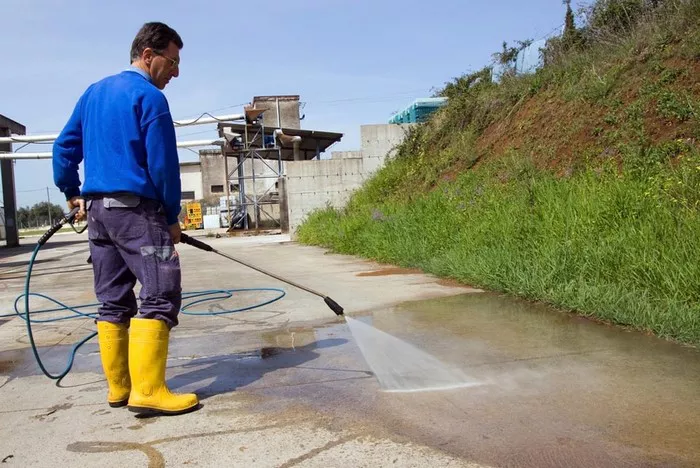Power washing, also known as pressure washing, is a cleaning method that utilizes pressurized water to remove dirt, grime, and other contaminants from various surfaces. It’s a versatile and effective solution for cleaning driveways, sidewalks, decks, and more. While power washing can be performed using water alone or with the addition of detergents, many users wonder if they can achieve satisfactory results without the use of chemicals.
Typical Power Washing Practices
Power washing typically involves the use of pressurized water alone or in combination with detergents to clean surfaces effectively. Water alone can often suffice for routine cleaning tasks, while detergents are used to tackle tough stains, grease, and mold.
Water-Only Power Washing
Feasibility
It is indeed possible to power wash with just water, especially for routine cleaning tasks. The high-pressure water stream generated by a power washer can dislodge and remove dirt, debris, and light stains from surfaces effectively.
Suitable Surfaces
Surfaces such as sidewalks, driveways, decks, and some types of outdoor furniture can be adequately cleaned with water alone. These surfaces typically accumulate dirt, dust, and organic matter that can be effectively removed using high-pressure water.
Cleaning Power of Water
High Pressure
The primary cleaning mechanism in power washing is the high-pressure water stream. The force of the water can penetrate deep into porous surfaces, dislodging and flushing away dirt, grime, and other contaminants.
Hot Water vs. Cold Water
While hot water can enhance the cleaning effectiveness of power washing by helping to dissolve grease and oil stains, cold water power washing is still highly effective for most cleaning tasks. Hot water power washing is particularly beneficial for removing stubborn stains in industrial or commercial settings.
Limitations of Water-Only Power Washing
Stains and Tough Grime
While water alone can effectively clean many surfaces, some stains and tough grime may require the use of detergents or cleaning agents to be fully removed. This is especially true for oil-based stains and deeply embedded dirt.
Oil and Grease
Oil and grease stains are notoriously difficult to remove with water alone. These substances require the use of specialized degreasers or detergents to break down the oils and facilitate removal.
Benefits of Using Detergents
Enhanced Cleaning
Detergents can significantly enhance the cleaning power of water by breaking down tough stains, grease, and oil. They work by loosening the bond between the contaminants and the surface, making it easier to rinse them away.
Surface Protection
Certain detergents also provide surface protection by forming a protective barrier that repels water, dirt, and stains. This helps to prevent future staining and makes maintenance cleaning easier.
Environmental Considerations
Chemical Runoff
One of the environmental concerns associated with power washing is the runoff of detergents and chemicals into the surrounding environment. Chemical runoff can contaminate soil and waterways, posing risks to plant and aquatic life.
Biodegradable Options
To minimize environmental impact, users can opt for biodegradable detergents that break down naturally and are less harmful to the environment. These eco-friendly options are safer for use around plants, animals, and water sources.
Safety Precautions
Protective Gear
When power washing, it’s essential to wear protective gear such as goggles, gloves, and closed-toe shoes to protect against flying debris and pressurized water.
Surface Damage
Excessive pressure or hot water can damage delicate surfaces such as wood, vinyl, and painted surfaces. It’s crucial to adjust the pressure settings and temperature accordingly to avoid causing damage.
Alternatives to Detergents
Pre-Treatment
For stubborn stains, pre-treating the surface with environmentally friendly solutions before power washing can help loosen dirt and grime without the need for detergents.
Mechanical Scrubbing
Mechanical scrubbing brushes or attachments can assist in removing tough grime without the use of detergents. These attachments agitate the surface, helping to dislodge dirt and debris for easier removal.
Conclusion
In conclusion, power washing with just water is feasible for many routine cleaning tasks, especially on surfaces like sidewalks, driveways, and decks. However, for tough stains, grease, and oil, the use of detergents can significantly enhance cleaning effectiveness. Users should carefully consider their cleaning needs, environmental implications, and surface types when deciding whether to use detergents in power washing. By balancing effectiveness with environmental impact and practicing proper safety precautions, users can achieve clean, pristine surfaces while minimizing harm to the environment.

